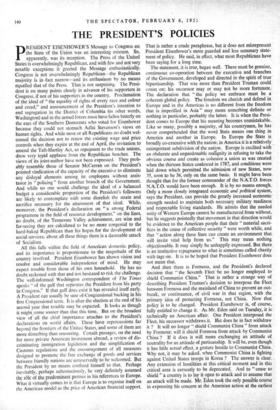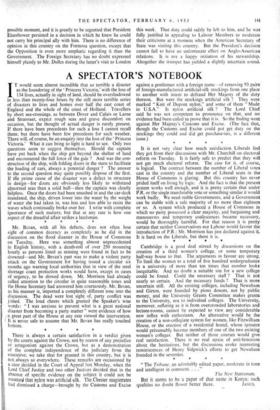THE PRESIDENT'S POLICIES
pRESIDENT EISENHOWER'S Message to Congress on the State of the Union was an interesting mixture. So, apparently, was its reception. The Press of the United States is overwhelmingly Republican, and with few and not very notable exceptions it greeted the Message enthusiastically. Congress is not overwhelmingly Republican—the Republican majority is in-fact narrow—and its enthusiasm by no means equalled that of the Press. That is not surprising. The Presi- dent is on many points dearly in advance of his supporters in Congress, if not of his supporters in the country. Proclamation of the ideal of " the equality of rights of every race and colour and creed," and announcement of the President's intention to end segregation in the District of Columbia (in other words, Washington) and in the armed forces must have fallen bitterly on the ears of the Southern Democrats who voted for Eisenhower because they could not stomach Adlai Stevenson's views on human rights. And while most or all Republicans no doubt wel- comed the decision not to renew the existing wage and price controls when they expire at the end of April, the invitation to amend the Taft-Hartley Act, so repugnant to the trade unions, drew very tepid applause from the Republican benches. The views of its joint-author have not been expressed. They prob- ably resemble those of Senator McCarran on the President's pointed vindication of the capacity of the executive to eliminate any disloyal elements among its employees without assis- tance in " policing " from another branch of the Government. And while no one would challenge the ideal of a balanced budget a considerable proportion of the President's followers are likely to contemplate with some disrelish the strain and sacrifice necessary for the attainment of that ideal. While, moreover, the President's. declaration on " a .strong Federal programme in the field of resource development," on the lines, no doubt, of the Tennessee Valley achievement, are wise and far-seeing they are calculated to be no more congenial to the hard-baked Republican than his hopes for the development of social services; about all these things there is a damnable smack of Socialism.
All this falls within the field of American domestic policy, and its importance is proportionate to the magnitude of the country involved. President Eisenhower has shown vision and resolve and considerable independence of mind. He may expect trouble from those of his own household. He has no doubt reckoned with that and not hesitated to risk the challenge. The well-informed Washington correspondent of The Times speaks " of the gulf that separates the President from his party in Congress." If that gulf does exist it has revealed itself early. A President can usually be sure of Congressional backing in his first Congressional term. It is after the election at the end of his second year that trouble may be expected. It looks as though it might come sooner than that this time. But on the-broadest view of. all the chief importance attaches to the President's declarations on world affairs. These have repercussions far beyond the frontiers of the United States, and some of them are more disturbing than reassuring. Certaiit passages, on the need for more private American investment abroad, a review of dis- criminating immigration legislation and the simplification of Customs regulations and the encouragement of all measures designed to promote the free exchange of goods and services between friendly nations are unreservedly to be welcomed. But the President by no means confined himself to that. Perhaps inevitably, perhaps subconsciously, he very definitely assumed the rOle of the predominant partner in his references to Europe.
What it virtually comes to is that Europe is to organise itself on the American model as the price of American financial support. That is rather a crude paraphrase, but it does not misrepresent. President Eisenhower's more guarded and less summary state- ment of policy. He said, in effect, what most Republicans have been saying for a long time.
The statement, it is true, began well. There must be genuine, continuous co-operation between the executive and branches of the Government, developed and directed in the spirit of true' bipartisanship. That was more than President Truman could, count on; his successor may or may not be more fortunate. The declaration that " the policy we embrace must be a coherent global policy. The freedom we cherish and defend in Europe and in the Americas is no different from the freedom that is imperilled in Asia " may mean something definite or nothing in particular, probably the latter. It is when the Presi-. dent comes to Europe that his meaning becomes unmistakable. Like so many, possibly a majority, of his countrymen, he has never comprehended that the word State means one thing in America and another in Europe. In Europe the State is. broadly co-extensive with the nation; in America it is a relatively_ unimportant subdivision of the nation. Europe is credited with an obdurate and unpardonable malignity in refusing to take the obvious course and create as cohesive a union as was created: when the thirteen States coalesced in 1787, and conditions were- laid down which permi4ed the admission of new States, now. 35, soon to be 36, only on the same basis. It might have been. thought that for the former commander of the N.A.T.O. forces- N.A.T.O. would have been enough. It is by no means enough. Only a more closely integrated economic and political system, says the President, can provide the greatly increased economic- strength needed to maintain both necessary military readiness' and respectable living standards. He admits that the needed unity of Western Europe cannot be manufactured from without, but lie suggests pointedly that movement in that direction would be evidence to the American people that their " material sacri- fices in the cause of collective security " were worth while, and that " action along these lines can create an environment that, will invite vital help from us." This may mean nothing objectionable. It may simply be unhappily expressed. But there is adinstinctive repugnance to what is sometimes called charity with tags on. It is to be hoped that President Eisenhower does not mean that.
And _then there is Formosa, and the President's declared decision that " the Seventh Fleet be no longer employed to shield Communist China." That is rather a strange way of describing President Truman's decision to interpose the Fleet between Formosa and the mainland of China to prevent an out- break, or continuance, of civil war in that region, with the primary idea of protecting Formosa, not China.. Now that policy is to be changed. President Eisenhower is, of course,. fully entitled to change it. As Mr. Eden said on Tuesday, it is. technically an American affair. One President interposed the Fleet, his successor withdraws it. But does he in fact withdraw it ? It will no longer "shield Communist China " from attack by Formosa; will it shield Formosa from attack by Communist China ? If it does it will mean exchanging an attitude of neutrality for an attitude of partisanship. It will be, even though it has little actual effect, a gesture hostile to Communist China. Why not, it may be asked, when Communist China is fighting against United States troops in Korea ? The answer is clear.. Any extension of hostilities at this critical moment and in this critical area is earnestly to be deprecated. And to " cease to shield " a country is to lay it open to attack and to assume that an attack will be made. Mr. Eden took the only possible course in expressing his concern at the American action at the earliest possible moment, and it is greatly to be regretted that President Eisenhower persisted in a decision in which he knew he could not carry his principal ally with him. There is no difference of opinion in this country on the Formosa question, except that the Opposition is even more emphatic regarding it than the Government. The Foreign Secretary has no doubt expressed himself plainly to Mr. Dulles during the latter's visit to London this week. That duty could safely by left to him, and he was fully justified in appealing to Labour Members to moderate their criticisms at a moment when the American Secretary of State was visiting this country. But the President's decision cannot fail to have an unfortunate effect on Anglo-American relations. It is not a happy initiation of his stewardship. Altogether the trumpet has yielded a slightly uncertain sound.



































 Previous page
Previous page